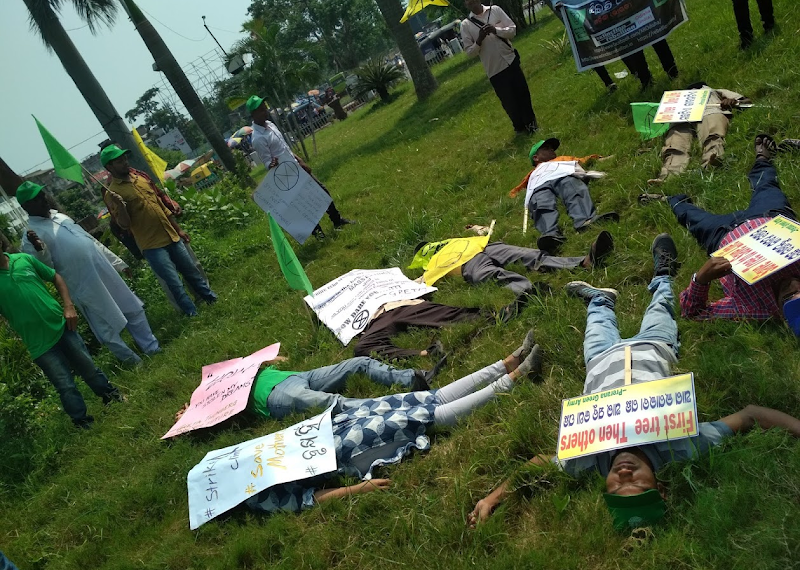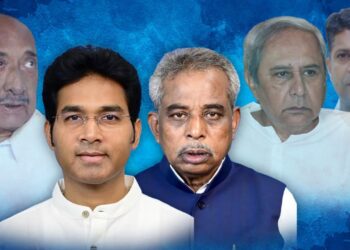Dhanada K Mishra, Hong Kong, 8 May 2024
India is in the middle of a General election and Odisha is having its simultaneous election for both Parliament and Assembly. The political debate seems to be completely devoid of any concern about the environment or the unfolding climate crisis. By contrast, it is still dominated by the issues of caste, religion, corruption and so-called development – mostly taken to be economic growth in terms of GDP. While the Indian National Congress has come up with a very thoughtful and well-prepared manifesto around its five ‘Nyays’ which has become a central topic for debate, the BJP’s manifesto in the form of Modi’s guarantees left much to be desired. It’s ironic that while people line up to vote in the height of summer with temperatures breaking new records every day, the climate crisis is not even on the table as a topic of debate or discussion.

In this background, it was a small relief when I came across the climate manifesto released by social activists from Odisha led by a group including my friend Sujit, the founder of Bakul Library. It is an excellent document resulting from wide-ranging consultation that captured the key issues facing the people and proposals to address them. While coming as it did during the ongoing general election in India, I wish it had come even earlier, as it could have dominated the debate.
Odisha, the land of rich biodiversity and cultural heritage, stands at the forefront of the climate crisis even more so than other parts of India. From devastating cyclones to erratic rainfall and rising sea levels, the state is bearing the brunt of a changing climate. The urgency of the situation demands immediate action, and the upcoming elections present a crucial opportunity to hold political parties accountable for their climate commitments.
However, a cursory glance at the election manifestos of the two major national parties, the Indian National Congress (INC) and the Bharatiya Janata Party (BJP), reveals a disheartening lack of focus on climate issues. Relegated to the last section of their manifestos, both just mention the need for sustainable development and environmental protection, these remain largely limited to token gestures, devoid of concrete plans and ambitious targets. The Congress has put forward a much better manifesto around the theme of justice, but somehow climate justice seems to have escaped their attention too.
This lack of political will to address the climate crisis is a reflection of a larger apathy towards environmental issues in India. Despite being one of the most vulnerable countries to climate change, India’s political discourse continues to be dominated by issues of economic growth and social development, with the environment often relegated to an afterthought.
This approach is not only short-sighted but also detrimental to the long-term well-being of the nation. The climate crisis is not just an environmental issue; it is a threat to our food security, water resources, public health, and economic stability. Ignoring it will only exacerbate the challenges we face, leading to further displacement, poverty, and conflict.
To truly address the climate crisis and build a sustainable future, India needs a Green party that can fundamentally rethink its development trajectory. This party should prioritize environmental protection, renewable energy, sustainable agriculture, and climate-resilient infrastructure. It should advocate for a just transition away from fossil fuels, ensuring a fair and equitable distribution of the costs and benefits of this shift.
While the emergence of Extinction Rebellion (XR), Friday For Future (FFF) and other European green movements offer valuable lessons, it is crucial to remember that India’s unique context requires its own unique solutions. We must draw inspiration from the legacy of Mahatma Gandhi, whose principles of non-violent resistance, self-reliance, and ecological harmony provide a powerful framework for building a sustainable future.
The climate manifesto drafted by activists in Odisha serves as a powerful call to action. It outlines a comprehensive set of demands, including:
- Declaring a climate emergency and prioritising climate action in all government policies.
- Investing in renewable energy and phasing out fossil fuels.
- Protecting forests and biodiversity.
- Promoting sustainable agriculture and food systems.
- Building climate-resilient infrastructure.
- Empowering local communities to adapt to climate change.
These demands are not merely aspirational; they represent the urgent need for action in the face of a looming crisis. The upcoming elections provide an opportunity for the people of Odisha to demand accountability from their elected representatives and push for a future that is just, equitable, and sustainable.
Recently, Sonam Wangchuk, the famous environmentalist from Ladakh went on a 21 days fast to protest against the mindless destruction of the fragile ecology of the Himalayan region in the name of development. Unfortunately, no one from the Government would pay any heed other than suppressing the people from carrying out a march and even shutting down the internet to contain the fallout.
Imagine a future when an election in India will be dominated by issues such as the above instead of caste, creed, crime, and corruption or worse still, Mandir, Masjid, mutton, etc. With activists like Medha Patkar, Sonam Wangchuk or our very own Prafulla Samantara, debating these important issues and people voting for their preferred parties and leaders who would save the future of their children. Perhaps Odisha can lead the way.





